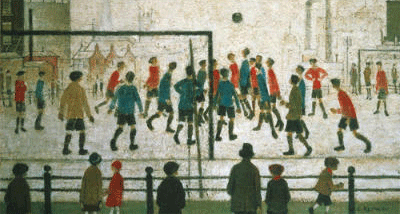
November 25, 2011, by Stephen Mumford
Childish Pleasures
I’m delighted that Nottingham is hosting a major exhibition of the paintings of L. S. Lowry. My children saw the brochure and found it interesting but amusing. Lowry’s work has a childlike quality, which to an extent explains how it took some time for him to be accepted as a great artist. The arts often have this childish nature. Many of the philosophical questions I have spent my career pondering have been the sorts of things a grown adult shouldn’t ask. What is a table? What is a circle? Does time flow? Are absences real things? It is almost as if this innocent sense of wonder is trained out of us so that we can take our place in the adult world. And what real use is it to anyone that Lowry spent his time painting those pictures?
We shouldn’t be afraid to indulge our inner child. To spend 5 minutes contemplating a Lowry painting is a fairly useless activity. But not everything we do should be for some practical purpose. A child knows this. They will do many pointless things just for the sheer joy of it. And if we lose too much sight of this then we will gradually lose our humanity and become mere parts of a machine.
Many of the things that we do bring us no pleasure at all. We spend our time in unpleasant activities just for some other purpose. We earn a wage that we can spend on what we really want. The arts, however, have also an intrinsic value. We look at paintings, watch movies, read novels, think philosophically, dance, and so on, purely because it is pleasing to do so. I have no doubt that those skilled in the arts can use their talents in other ways – some of them useful – but that is not their point. The arts are there to be viewed through childish eyes with a sense of wonder.
For more details of the Lowry exhibition at Nottingham’s Lakeside, see http://www.lakesidearts.org.uk/Exhibitions/ViewEvent.html?e=1852&c=5&d=0
No comments yet, fill out a comment to be the first

Leave a Reply